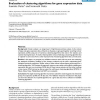704 search results - page 52 / 141 » Learning the Ideal Evaluation Function |
IJCAI
2007
13 years 11 months ago
2007
This work presents a new algorithm, called Heuristically Accelerated Minimax-Q (HAMMQ), that allows the use of heuristics to speed up the wellknown Multiagent Reinforcement Learni...
NIPS
2003
13 years 11 months ago
2003
We exploit some useful properties of Gaussian process (GP) regression models for reinforcement learning in continuous state spaces and discrete time. We demonstrate how the GP mod...
BMCBI
2006
13 years 10 months ago
2006
Background: Cluster analysis is an integral part of high dimensional data analysis. In the context of large scale gene expression data, a filtered set of genes are grouped togethe...
ICML
2004
IEEE
14 years 10 months ago
2004
IEEE
This paper extends previous work on the Skewing algorithm, a promising approach that allows greedy decision tree induction algorithms to handle problematic functions such as parit...
ATAL
2008
Springer
14 years 1 days ago
2008
Springer
In reinforcement learning, least-squares temporal difference methods (e.g., LSTD and LSPI) are effective, data-efficient techniques for policy evaluation and control with linear v...

